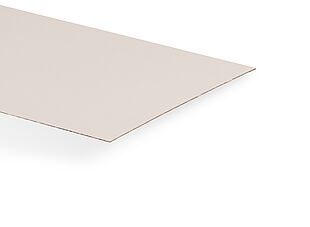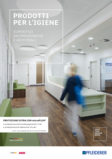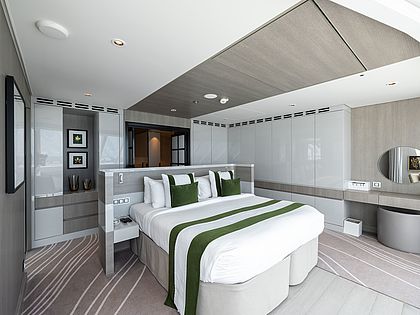Areas of application
Flame retardant surface material for preventive fire protection in the decorative sector in ship interior fitting. Particularly for corridors and stairways, for partition walls, doors, wall and ceiling coverings.
Certificates & labels
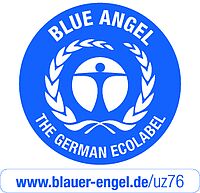
Blue Angel DE-UZ 76
The Blue Angel has been the federal government's eco-label for 40 years. Independent and credible, it sets demanding standards for environmentally friendly products and services. The Blue Angel is the orientation for sustainable purchasing.
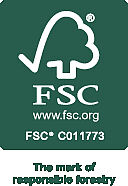
FSC-certified
The Forest Stewardship Council (FSC) is a global, not-for-profit organization dedicated to the promotion of responsible forest management worlwide. FSC defines standards based on agreed principles for responsible forest stewardship that are supported by environmental, social and economic stakeholders.
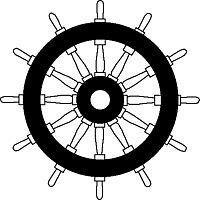
IMO Approval
The International Maritime Organization is responsible for measures to improve the safety and security of international shipping and to prevent pollution from ships. Its goal is safe and efficient shipping on clean oceans.
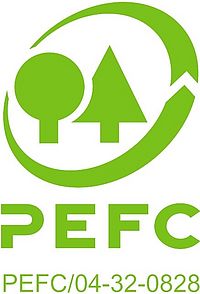
PEFC certified
PEFC is the largest institution for ensuring sustainable forest management through an independent certification system. Wood and wood products with the PEFC seal originate demonstrably from ecologically, economically and socially sustainable forestry.
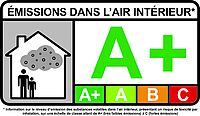
Émissons dans l'air intérieur
Emission-tested building materials and products can make an important contribution to good indoor air quality. The emission label A+ to C is used to identify the emissions of building products and materials for interior design and has its origins in France. Class A+ stands for particularly low-emission products, class C for the highest-emission products.
Product section

Availability
Formats
| Length (mm) | Width (mm) | Thickness (mm) |
|---|---|---|
| 2,050 - 5,300 | 1,300 | 0.6 | 0.8 |
| 2,150 | 915 | 0.8 |
| 2,150 | 950 | 0.8 |
| 2,150 | 1,050 | 0.8 |
| 2,150 | 1,300 | 0.8 |
| 2,350 | 1,050 | 0.8 |
| 2,350 | 1,300 | 0.8 |
| 2,800 | 2,070 | 0.6 | 0.8 | 1.2 |
| 3,050 | 1,300 | 0.8 |
| 4,100 | 1,300 | 0.6 | 0.8 |
| 5,300 | 1,300 | 0.6 | 0.8 |
| 5,600 | 2,070 | 0.6 | 0.8 | 1.2 |
Product features
Product standard
- EN 438-3
Density
- Min. 1,350 kg/m³
Marine Approvals
- 2,050 x 1,300 x 0.6 - 0.8 mm: MED – Low Flame-Spread Surface Material, USCG – Low Flame-Spread Surface Material, CCS – Low Flame-Spread Material
- 2,150 x 915 x 0.8 mm: MED – Low Flame-Spread Surface Material, USCG – Low Flame-Spread Surface Material, CCS – Low Flame-Spread Material
- 2,150 x 950 x 0.8 mm: MED – Low Flame-Spread Surface Material, USCG – Low Flame-Spread Surface Material, CCS – Low Flame-Spread Material
- 2,150 x 1,050 x 0.8 mm: MED – Low Flame-Spread Surface Material, USCG – Low Flame-Spread Surface Material, CCS – Low Flame-Spread Material
- 2,150 x 1,300 x 0.8 mm: MED – Low Flame-Spread Surface Material, USCG – Low Flame-Spread Surface Material, CCS – Low Flame-Spread Material
- 2,350 x 1,050 x 0.8 mm: MED – Low Flame-Spread Surface Material, USCG – Low Flame-Spread Surface Material, CCS – Low Flame-Spread Material
- 2,350 x 1,300 x 0.8 mm: MED – Low Flame-Spread Surface Material, USCG – Low Flame-Spread Surface Material, CCS – Low Flame-Spread Material
- 2,800 x 2,070 x 0.6 - 1.2 mm: MED – Low Flame-Spread Surface Material, USCG – Low Flame-Spread Surface Material, Transport Canada – Low Flame Spread Surface Linings
- 3,050 x 1,300 x 0.8 mm: MED – Low Flame-Spread Surface Material, USCG – Low Flame-Spread Surface Material, CCS – Low Flame-Spread Material
- 4,100 x 1,300 x 0.6 - 0.8 mm: MED – Low Flame-Spread Surface Material, USCG – Low Flame-Spread Surface Material, CCS – Low Flame-Spread Material
- 5,300 x 1,300 x 0.6 - 0.8 mm: MED – Low Flame-Spread Surface Material, USCG – Low Flame-Spread Surface Material, CCS – Low Flame-Spread Material
- 5,600 x 2,070 x 0.6 - 1.2 mm: MED – Low Flame-Spread Surface Material, USCG – Low Flame-Spread Surface Material, Transport Canada – Low Flame Spread Surface Linings
Formaldehyde emission class
- E1 E05
Antimicrobial effect
- Surface with antimicrobial effect in 24 h for interior fit-out and finishes – Test Methodology JIS Z 2801 / ISO 22196
Product safety
- This product follows the REACH regulation EC 1907/2006 an article. Following Article 7 it does not need to be registered.
- The surface is physiologically safe, and approved for direct contact with food acc. to Regulation (EU) No. 10/2011.
- The decorative surface and the core consists of paper layers, which are impregnated with thermosetting resins. The resins harden completely during the manufacturing process by heat and high-pressure. They form a stable, resistant and non-reactive material.
- We manufacture the panels without the use of halogens, heavy metals, preservatives, wood protectors or organic solvents.
Special
- Classification MED, USCG, Transport Canada for width 2,070 mm
- FSC certification or PEFC certification available on request.
Colour and surface match
- Decor, structure and core board all influence the final appearance of the end product.
- Due to the product-specific differences in production technologies, even identical decor/structure/core board combinations can result in slight optical and tactile deviations across different product groups and formats. Such deviations do not constitute a defect.
- The choice of surface structure in particular has a significant influence on the visual impression, the tactile perception as well as the technical characteristics of the product. Thus, the overall impression of a decor can change almost completely depending on the surface structure. Furthermore, mechanical influences on the product surface can lead to a higher contrast optical perception with dark decors.
- To ensure that you always achieve the best results with our products and to clarify any deviations in advance, we will be happy to advise you individually.
Product handling
Processing
- Please respect the recommendations of BLFA (www.blfa.co.uk) an ICDLI (www.icdli.com) for the processing of high-pressure laminates.
- For the production of flat-bonded panels we recommend a symmetric construction. This means both sides should be identical HPL. If backing material (also HPL) is used, there is a risk of bowing.
- Sufficient conditioning is required prior to installation and assembly. The premises themselves need to be at the normal climatic conditions in which the material will later be used.
- Especially for large applications, we recommend paying attention to the colour and texture uniformity of the boards and cut products used when further processing and installing and that the production direction is taken into account.
- We recommend carrying out your own tests depending on the respective application and material requirement.
Storage, handling and transport
- The material must be stored flat, level and horizontal on clean surfaces at normal climatic conditions (Temperature 18–25 °C, relative humidity 50–65 %).
- Protect from moisture and wet conditions.
- Avoid direct exposure to heat and any possible dehydration of the surfaces by light- or heat radiation or by air currents from heating- or air conditioning systems.
- Avoid exposure to direct sunshine or UV rays, especially of products covered in film.
- The stack must be weighed-down with a cover panel.
- These storage conditions must continue to be ensured after removing panels from the stack.
- Vertical storage is not recommended.
- Please note that incorrect storage, regardless of its duration, may cause irreversible distortion to the sheets.
- Foreign bodies or impurities in the pallet of sheets can lead to impressions and damage to the surface of the board.
- Sheets / boards must not be moved against each other, they should be moved individually by hand or with suction equipment.
- Ensure that sufficiently large and sturdy bases, e.g. pallets, are used for the transportation of stacked sheets. The sheets on the pallet must be secured against slipping.
Health and safety
- Please wear the appropriate personal protective equipment (PPE) when processing and handling.
- Provide adequate extraction when splitting / sanding.
Cleaning and care
- The surface can be cleaned with water and gentle cleaning agents. To remove stubborn stains, please observe the recommendations in the data sheet "Cleaning of HPL surfaces" (www.icdli.com).
Disposal
- Energy recovery in industrial furnaces at temperatures above 700 °C.
Technical downloads
You like to learn more?
Please get in touch with us! We look forward to hearing from you.
